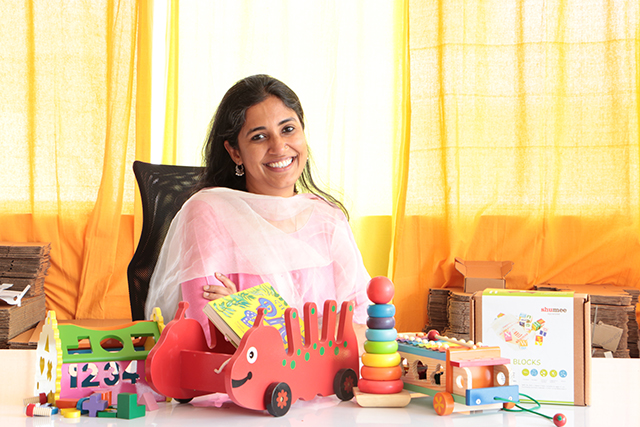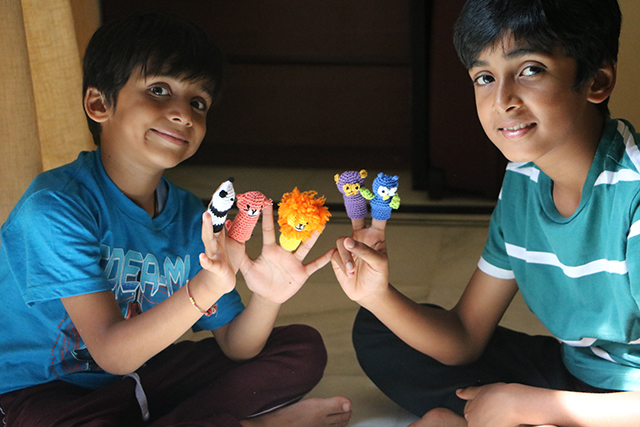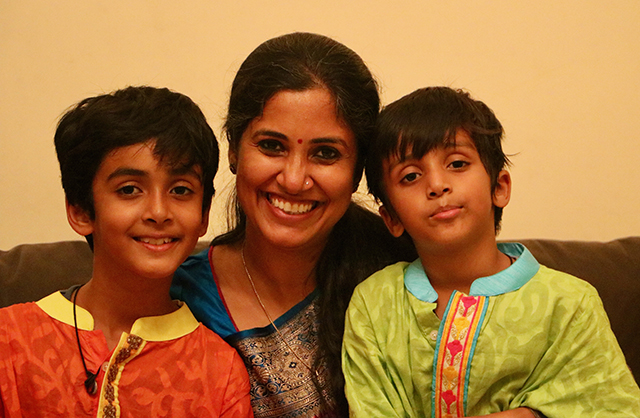Work meets play for this computer engineer-turned-toymaker
A few years ago, alumna Meeta Gupta was working with one of the most technologically advanced supercomputers in the world. Today, she spends her days designing wooden toys that are so simple they don’t even require batteries.
“When I look back at my journey, I would have never thought I would be an entrepreneur doing something like this,” said Gupta, Ph.D. ’09, founder of sustainable toy company Shumee. “Ten years ago, I would have thought that research was what I should be doing. But life took me in a different direction and it has been equally rewarding.”

During her graduate studies at Harvard, Meeta Gupta never expected she would become founder of a sustainable toy company. (Photo courtesy of Meeta Gupta)
Ten years ago, Gupta was finishing her Ph.D. in computer engineering, completing a thesis on reliability aware computer systems in the lab of David Brooks, Haley Family Professor of Computer Science at the Harvard John A. Paulson School of Engineering and Applied Sciences (SEAS).
She studied issues related to technology scaling and how they can be addressed at the architecture layer of high-performance computers. By proposing solutions within the architecture, Gupta sought to enable applications to detect and handle error conditions without disrupting the system’s performance.
“What I enjoyed most was the problem solving aspect of it,” she said. “It was fun and challenging to understand what the issues are, come up with solutions, and see if they actually work. It requires a lot of perseverance.”
After graduation, Gupta joined the IBM TJ Watson Research Center, where she continued her work using the firm’s latest supercomputer. She also examined reliability issues in IBM processors and applied micro-architecture research to solve product issues.
The scale of IBM’s massively parallel machine presented the biggest obstacles, she said. In such a huge system, there can be many points of failure, so researchers were challenged to address many different, interconnected issues without letting the performance of the entire system suffer.
During her tenure at IBM, Gupta, then a mother of two young boys, moved back to her native India and continued working on the high performance computing team remotely.

Trying to find open-ended toys in India for her two sons inspired Gupta to launch Shumee. (Photo courtesy of Meeta Gupta)
But everything changed after a trip to the local toy store.
Gupta was searching for a simple, wooden toy she had purchased for her older son while living in the U.S., but she couldn’t find it for sale anywhere in Bangalore. She broadened her search, and found only a few quasi-similar products available anywhere in India, all at a premium price.
She saw an opportunity.
“India has a big handicraft toy industry, but the limited designs and quality issues were the main challenges,” she said. “I wanted to see if we could train artisans and work with smaller scale factories in India to design toys that are more open-ended, which let the child explore, discover, and do more free play, but at the same time are very safe, using lead-free paints. So the journey started from there.”
Gupta cold-called the owner of a local toy manufacturer and the two hit it off immediately. She created two simple wooden designs, which the manufacturer agreed to produce, and they launched a small boutique offering on an e-commerce portal. Shumee was born.

Open-ended toys like these wooden blocks from Shumee enable children to be creative. (Photo courtesy of Meeta Gupta)
Three years later, Gupta has a team of eight who work to design and market all the company’s toy designs. Shumee contracts with 10 local manufacturers to create more than 100 different products, from simple, wooden toys, to accessories like toy storage bins, and baby essentials like bibs, blankets, and mittens.
“The design philosophy followed at Shumee is that play should be driven by the child and not by the toy,” Gupta said. “We believe toys should be minimalistic in nature, so it gives the child many opportunities to explore and discover in his or her own way.”
The toys are also safe and sustainable—each is produced from natural materials, uses nontoxic and lead-free paints, and doesn’t require batteries or other chemicals.
It has been challenging to grow the company in the vastly fragmented Indian market, Gupta said. In addition, the country is flooded with cheap toys produced in China, and consumers are very price sensitive. But at the same time, Gupta is seeing parents become more conscious of safety and sustainability, which is helping Shumee grow.
As the company has expanded, Gupta feels like she has grown along with it.
“I have learned a lot over the past three years. Sometimes I feel like this is my second Ph.D. The only difference is that here I am my own guide and my own student,” she said. “The whole idea of how to get a product from design to market—everyday is a new learning experience for me.”
The analytical and problem solving skills she developed at SEAS, as well as the perseverance that comes from pushing forward with a Ph.D., help her overcome entrepreneurial growing pains.
Shumee recently completed a small angel round in India and is looking to expand the team, grow its portfolio of products, and explore global markets in the U.S., Europe, Australia, and the Middle East. The company also recently began selling products through Amazon.com.
While the prospect of becoming a global brand is exciting for Gupta, the biggest rewards of her work come much closer to home.
“The most rewarding thing for me is when my two boys connect with me on Shumee,” she said. “Even though they are now 10 and 7, I can still see how much they enjoy playing with the toys, which gives me validation and reminds me that play has no age. Anything can be played by anyone.”
